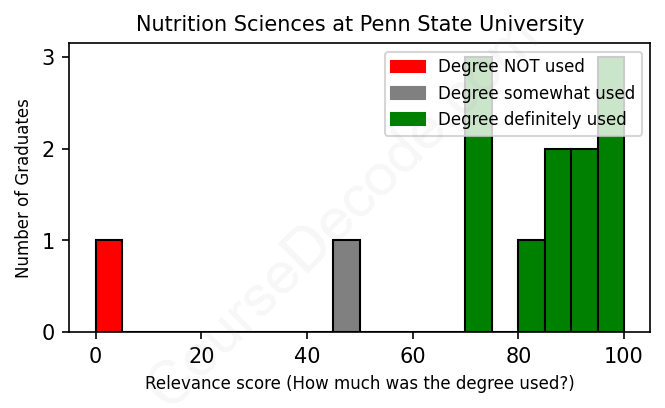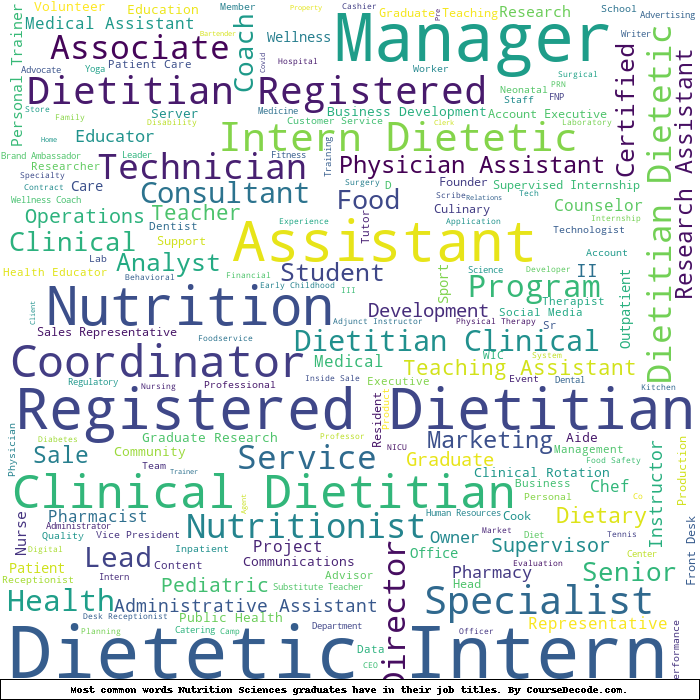
First, some facts. Of the Nutrition Sciences graduates from Penn State University we've analyzed , here's how many have used (or NOT used) their degree in their career:

These are estimates based on AI analysis of 13 LinkedIn profiles (see below).
The verdict? Above average. Overall, with an average relevance score of 76%, Nutrition Sciences graduates from Penn State University have a higher likelihood (+9%) of finding work in this field compared to the average graduate across all fields:
And for comparison, here's the chart for all profiles we've looked at across all degrees.
Also, after graduating, 61% of these graduates have pursued further education other than another Bachelor's degree (such as a Masters degree or other), compared to the average across all profiles of 35%. This suggests you may need more than just a Bachelors degree to be competitive as a Nutrition Sciences graduate.
See the details:
|
Relevance score: 72% We think this person has gone into a career highly relevant to their degree. We think this person has gone into a career highly relevant to their degree.
DEGREE INFOGraduated in 2014 from Penn State University with a Bachelor of Science - BS in Nutrition Sciences. Also pursued further education since (see below). JOB HISTORY SINCE GRADUATIONCampus Minister DiscipleMakers Jun 2014 - Jun 2020 Group Fitness & Personal Trainer  TITLE Boxing Club Nov 2017 - Jun 2020 Middle School Teacher  Cornerstone Christian School Aug 2020 - Jun 2021 Clinical Dietitian  Morrison Healthcare Mar 2022 - Jun 2023 Sports Nutrition Assistant  James Madison University Aug 2022 - May 2023 Assistant Director of Sports Nutrition  James Madison University Jun 2023 - Present FURTHER DEGREES DONE SINCE GRADUATINGDietetic InternshipUniversity of Northern Colorado 2021 - 2022 ABOUTNo information provided. |
The top 10 most common jobs done by the graduates we've analyzed (ranked most common to least) are:
From analyzing the LinkedIn profiles of graduates with degrees in Nutrition Sciences from Penn State University, it's clear that many of them have landed jobs that heavily rely on their educational background. The most common roles seem to be in clinical settings—like Clinical Dietitians or Registered Dietitians—where these individuals are directly applying their nutrition knowledge to help patients manage dietary needs and health conditions. Other popular positions include roles in educational outreach, wellness consulting, and leadership in nutrition programs. All of these positions require a solid understanding of nutrition science, demonstrating a strong link between their job functions and their academic training.
However, it's also worth noting that not every job is closely related to nutrition sciences. Some positions—like food service management roles or certain operational management jobs—might touch on nutrition, but don’t rely on specialized knowledge from the degree on a daily basis. Additionally, some graduates have ventured into areas that are tangentially related, like personal training or wellness coaching, which incorporate elements of nutrition but not as the central focus. Overall, while a significant number of graduates are actively using their Nutrition Sciences education in meaningful ways, there is also a portion of them that have found their degree less relevant in their current job roles.
Here is a visual representation of the most common words in job titles for Nutrition Sciences graduates (this is across all Nutrition Sciences graduates we've analyzed, not just those who went to Penn State University):

When it comes to graduates from Penn State University's Nutrition Sciences program, the career paths are quite varied, but many show a clear trajectory toward roles that are relevant to nutrition and health. Most people seem to land their first jobs as dietetic interns, foodservice assistants, or in entry-level roles associated with clinical nutrition and wellness. For instance, those graduating around 2010 often started out as foodservice managers or dietetic interns and then progressed to registered dietitian roles or positions within healthcare services, reflecting a strong connection to their major. Over the past decade, many have taken on advanced roles, like directors of nutrition or wellness services, further solidifying their careers in fields related to nutrition.
Looking five or ten years down the line, many alumni end up in solid positions that leverage their Nutrition Sciences background. Graduates from 2010 to 2016 typically move into roles with increasing responsibility, such as registered dietitians, clinical dietitians, and even managerial roles in nutrition communication or health coaching. However, there are a few outliers—some graduates have ventured into fields like teaching or unrelated business roles, which may indicate that while many people thrive in nutrition-related jobs, others might not find their passion in that area. Overall, the trajectory for most Penn State Nutrition Sciences grads looks promising, with a majority successfully cultivating careers that directly link back to their education in nutrition.
Honestly, getting a Bachelor’s degree in Nutrition Sciences at Penn State can be a bit challenging, but it really depends on your interests and strengths. If you enjoy science classes—like biology and chemistry—and you’re passionate about nutrition and health, you might find it engaging and rewarding. The coursework can be pretty rigorous, with a lot of lab work and hands-on projects, especially if you dive deep into subjects like metabolic pathways or food science. It's not the easiest degree out there, but with dedication and a good study routine, it's definitely manageable! So, if you’re ready to hit the books and stay curious, you’ll probably do just fine.
Most commonly, in the LinkedIn profiles we've looked at, it takes people 4 years to finish a Bachelor degree in Nutrition Sciences.
Looking at the job history of these Nutrition Sciences graduates from Penn State, it seems like they’ve generally climbed the ladders in their respective fields, often moving from entry-level positions to more advanced roles like clinical dietitians, directors, and coordinators. Many have landed jobs in healthcare settings, which usually come with decent salaries, especially with experience and certifications like being a registered dietitian. Some have even made their way into academic roles or specialized positions, hinting that they’re likely earning well. However, there are a few doing roles that might not pay as much initially, like personal training or foodservice management. Overall, it looks like most are on a trajectory to make some good money, especially as they gain more experience and advance in their careers.
Here is a visual representation of the most common words seen in the "about" section of LinkedIn profiles who have a Bachelor degree in Nutrition Sciences (this is across all Nutrition Sciences graduates we've analyzed, not just those who went to Penn State University). This may or may not be useful:

Here are all colleges offering a Bachelor degree in Nutrition Sciences (ordered by the average relevance score of their Nutrition Sciences graduates, best to worst) where we have analyzed at least 10 of their graduates:
| College | Score | Count |
|---|---|---|
 University of Connecticut University of Connecticut
|
85 | 11 |
 Penn State University Penn State University
|
76 | 13 |
 California Polytechnic State University-San Luis Obispo California Polytechnic State University-San Luis Obispo
|
75 | 12 |
 University of New Hampshire University of New Hampshire
|
71 | 10 |
 Arizona State University Arizona State University
|
70 | 12 |
 Texas A&M University Texas A&M University
|
70 | 19 |
 The University of Texas at Austin The University of Texas at Austin
|
60 | 21 |
 Montclair State University Montclair State University
|
59 | 10 |
 Kaplan University Kaplan University
|
54 | 12 |
 University of Arizona University of Arizona
|
46 | 20 |